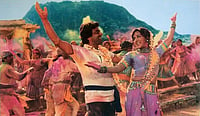The best thing about these stories is their momentum, their narrative drive. You keep turning the pages and there is always a pay-off at the end. Contemporary Indian short fiction too often assumes that a yard of angst or a few lengths of oppression are their own reward. Manjula Padmanabhan is never guilty of such self-indulgence. In fact, an essential part of her story-telling magic is the knack of turning petrifyingly worthy subjects into the stuff of fiction. For instance, before I read the title story I would have bet a lot of money against a story that took sati on board staying afloat. It is a subject so devoid of ambiguity that it is hard to think of how it could fit into the provisional and tentative narratives of fiction. If you're against sati nobody wants to know because so is everyone else; if you're for it nobody wants to know you...and quite right too. But Hot Death, Cold Soup not only stays afloat, it fairly zips along, it flies. By making the potential sati an American woman the author pre-empts the reader's reflexive judgements. The self-evident weirdness of an American wanting to do it makes you curious—and then you're riveted by the rapt precision of the writing which makes the strangeness of the setting and the bizarreness of the project ever more real and believable.
I feel ambivalent about Hot Death, Cold Soup. It's a brilliant story and easy to admire but it is difficult to like. Because this hypnotically detailed account of planned and voluntary immolation is so plausible, it seems to nibble away at a liberal article of faith: that sati is always a coerced act, properly described as widow-burning. Of course, the sati in question is American and strange, unrepresentative of Indian womanhood on both counts; still, it's a disturbing story. This is, perhaps, as it should be—first-rate fiction is meant to make you wonder.
My three most favourite stories are The Copper-Tailed Skink, The Annexe and A Government of India Under -taking, in no particular order. If someone teaching English literature wanted to show his students the difference between a sentimental weepy and a poignant, restrained yet moving story, he couldn't do better than make them read Silas Marner first and The Copper-Tailed Skink afterwards. The other two stories are variously absorbing but they are specially important as examples of a singular gift: the ability to describe disembodied, intangible states with dreamlike lucidity. There are other excellent stories in this book, like The Strength of Small Things (which, my tea leaves tell me, will be relentlessly anthologised) but none of these captures the characteristic strengths of Manjula Padmanabhan's fiction in the way that The Annexe and A Government of Indian Under -taking do. And these strengths are a) an openness to speculative ideas learnt in part (I think) from science fiction; and b) a corresponding talent for housing these ideas in invented contexts that are detailed and named with such empirical crispness that you want to cheer. Manjula Padmanabhan is a wonderful writer and this is a formidable debut.
























